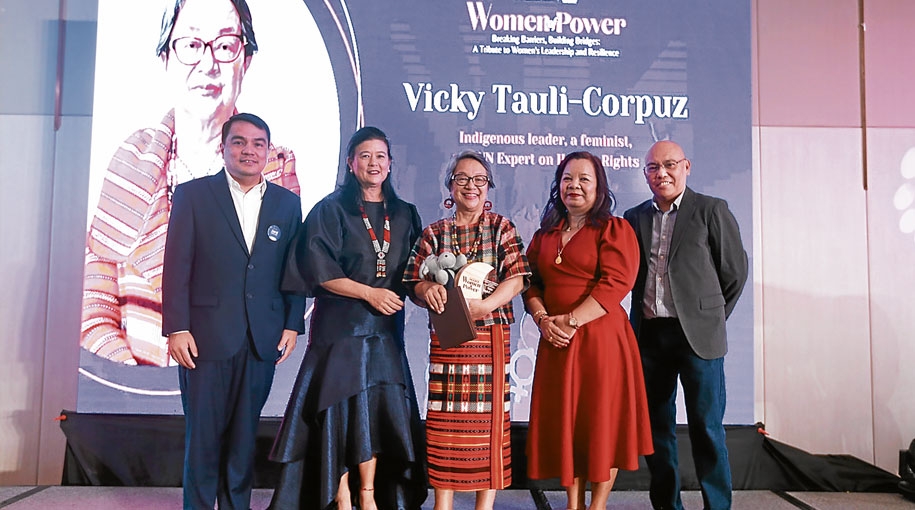[Image caption: ADVOCATE Indigenous people’s rights advocate Victoria Tauli-Corpuz (center) is flanked (from left to right) by Inquirer president and CEO Rudyard Arbolado, Inquirer Group of Companies president and CEO Sandy Prieto-Romualdez, associate publisher Juliet Labog-Javellana and executive editor Volt Contreras as she receives on March 11 her plaque and recognition as one of the Inquirer’s Women of Power awardees for 2024. —EUGENE ARANETA]
Just a few years ago, Nobel Peace Prize nominee Victoria “Vicky” Tauli Corpuz, had every reason to live in fear.
During the administration of President Rodrigo Duterte in 2018, she was included in a list of 600 scholars, activists, and lawyers that the Department of Justice (DOJ) had wanted a Manila Regional Trial Court to describe as terrorists, along with the New People’s Army, the Communist Party of the Philippines, and the National Democratic Front of the Philippines.
At that time, Corpuz was serving as the United Nations Special Rapporteur on the Rights of Indigenous Peoples, making the situation all the more alarming.
The Red-tagging stemmed from Corpuz’s condemnation of a 2017 large-scale military operation launched by Duterte to displace the “lumads,” the collective name for the indigenous group in Mindanao.
But the 71-year-old indigenous peoples (IP) rights advocate, who hails from Besao town in Mountain Province, did not waver in her mission to be the voice of the afflicted and the marginalized.
Corpuz, a Kankanaey-Igorot, says the unfounded accusations hurled at her only fueled her determination to stand up for IPs who continually face threats while defending their lands.
For her, giving in to fear would have meant conceding defeat.
Supported by the global community, which stood by her during that challenging period, Corpuz confronted the allegations without hesitation.
On Sept. 21 last year, the DOJ’s petition was dismissed by Manila Regional Trial Court Branch 19 Judge Marlo Magdoza-Malagar, who concluded that the government’s counterinsurgency measures “should include respect for the right to dissent, due process, and the rule of law.”
Corpuz is no stranger to being wrongly labeled for being an activist. During Martial Law under the late strongman Ferdinand Marcos Sr., her name was included in an “order of battle” or a hit list of personalities considered enemies of the state.
Prominent figure
With Corpuz’s devotion to mobilizing indigenous peoples and advocating for women’s rights in the last three decades, she has become a prominent figure in the global campaign for the recognition of IP rights.
And coming from a family of human rights and environmental defenders, Corpuz says she and her family members have endured persistent harassment and baseless allegations.
However, her efforts as an indigenous environmental defender resulted in her being shortlisted for the prestigious Nobel Peace Prize in 2023.
She is also known for her pivotal role in helping lead the successful push for the UN General Assembly to adopt the Declaration on the Rights of Indigenous Peoples in 2007. The declaration is an international instrument deemed a major, universal human rights document that IPs often resort to when defending their rights.
According to the website of the UN Human Rights Office, Corpuz also founded and managed various nongovernment organizations involved in social awareness raising, climate change, and the advancement of indigenous peoples’ and women’s rights, and she is a member of the UN Development Programme Civil Society Organizations Advisory Committee.
Currently, Corpuz serves as the executive director of IP research and advocacy group Tebtebba (Indigenous Peoples’ International Center for Policy Research and Education), where she advocates for constructive dialogue.


